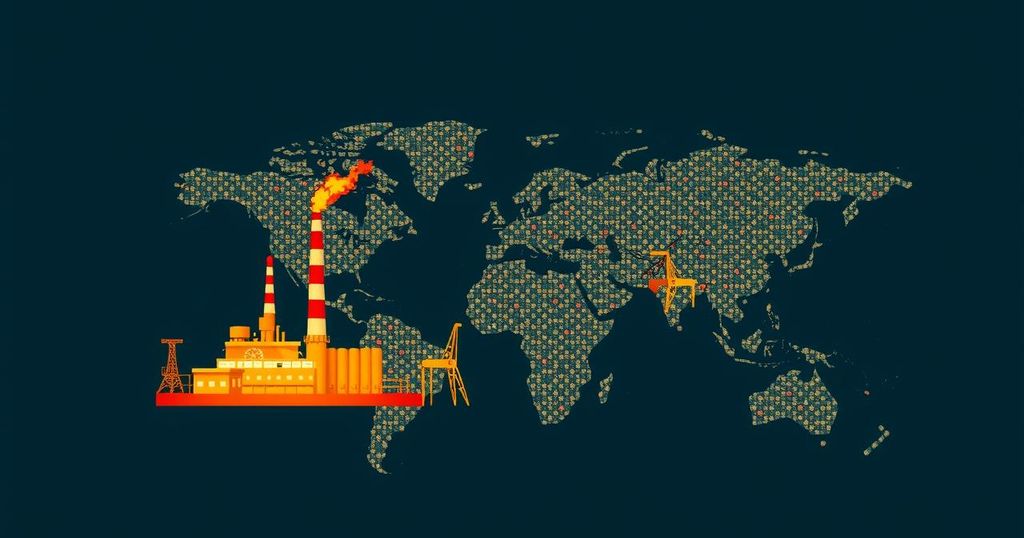COP29 in Baku witnesses extensive lobbying by the fossil fuel industry, with over 1,770 lobbyists present, overshadowing the voices of marginalized nations. Major corporations push for influence over climate negotiations, jeopardizing financial support necessary for vulnerable communities while employing greenwashing tactics to obscure their role in the climate crisis. Strong policymaking is crucial to counteract these influences, advocating for a transition towards clean energy.
The fossil fuel industry has a significant and concerning presence at COP29 in Baku, Azerbaijan, with approximately 1,770 lobbyists in attendance, which exceeds the representation of numerous national delegations. This disproportionate access raises alarms regarding the voices of climate-vulnerable nations being overshadowed, especially those from the Global South. The industry’s actions reflect a multi-faceted approach that includes lobbying, high-level engagements, and attempts to sideline necessary climate financing amidst their ongoing greenwashing tactics. At COP29, the fossil fuel sector’s participation is not merely quantitative; it boasts influential figures from major corporations such as ExxonMobil and BP convening with global leaders. For example, ExxonMobil’s CEO, Darren Woods, is positioned to define critical terms of the energy transition, presenting the dangers of undue political influence perpetuated by fossil fuel interests. Despite advocating for participation over withdrawal from climate agreements, Woods’ presence symbolizes a strategic maneuver to shape ongoing discussions in favor of fossil fuel reliance. Moreover, climate finance remains a central theme at COP29, particularly concerning compensation for impoverished nations experiencing climate impacts disproportionately fueled by fossil fuels. The delay in launching a $1 billion Climate Finance Action Fund, suggested by the host nation, highlights the struggle faced by advocates demanding accountability from fossil fuel producers and the urgent need for substantial international financial support. Further complicating the situation, multinational fossil fuel companies benefit from government subsidies that have reached $7 trillion globally, undermining genuine climate efforts. Companies like ExxonMobil focus on creating incentives for transitioning to less carbon-intensive technologies, all while potentially diverting attention from immediate and effective solutions necessary to meet climate targets by 2030. The communication strategies observed at COP29 are equally troubling, as fossil fuel corporations employ public relations mechanisms to promote a cleaner image, leveraging initiatives like the Oil and Gas Decarbonization Charter—a controversial tactic widely criticized by civil society groups. The pervasive ads and promotional materials utilize misleading narratives, exacerbating public misperception of fossil fuel impacts, thus clouding transparency and accountability in climate conversations. To address these challenges, it is essential to establish robust public policies that resist fossil fuel industry influence during climate negotiations. Historical evidence suggests that major fossil fuel companies, having known about the adverse effects of their products on global warming, cannot be trusted as cooperative partners in climate policymaking. Advocacy organizations and climate-conscious investors play a pivotal role in pressuring these corporations to align their actions with the urgent mandates of the Paris Agreement and to curtail their carbon emissions significantly. In summary, COP29 presents an essential opportunity for climate diplomacy to effectively counter the numerous undermining tactics of the fossil fuel industry. Leaders and negotiators are called upon to implement courageous strategies that foster a swift transition away from fossil fuel dependence, ensuring financial resources reach the communities most affected by climate change and propelling global efforts towards equitable clean energy alternatives.
The fossil fuel industry has long held a powerful role in shaping international climate policy, often prioritizing corporate interests over urgent climate action. At COP29, the industry’s substantial presence raises critical concerns about the disproportionate influence exerted by lobbyists, particularly in light of the significant challenges faced by marginalized and climate-vulnerable populations. This article examines the strategies employed by the fossil fuel industry to co-opt climate negotiations, highlighting the urgent need for policymakers to fortify their commitment to genuine climate solutions amidst corporate pressures.
In conclusion, the overwhelming presence of the fossil fuel industry at COP29 represents a significant threat to the integrity of climate discussions and the ability to achieve equitable solutions. By capitalizing on strategic access, lobbying practices, and attempts at greenwashing, the industry seeks to undermine essential climate finance and delay necessary transitions away from fossil fuels. It is imperative for global leaders to assert political will in order to counter these efforts, protect vulnerable communities, and advance meaningful climate action.
Original Source: blog.ucsusa.org






